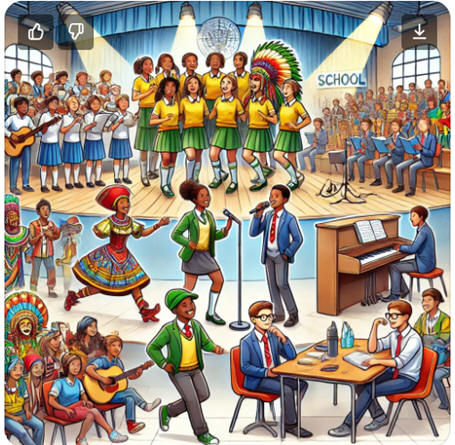|

When we think of school extracurriculars,
cultural activities like choir, debating, public
speaking, and drama are sometimes seen as secondary to
academics and sport. Yet, these activities are
fundamental to a learner's holistic development,
offering benefits far beyond their perceived marketing
value for schools.
Building Confidence and Communication
Skills
Participation in cultural activities
gives learners the opportunity to express themselves in
ways that a traditional classroom setting does not
always allow. Public speaking and debating, for example,
help learners develop strong communication skills,
critical thinking, and the ability to articulate their
thoughts clearly and persuasively - an essential skill
for future success.
Fostering Creativity and Self-Expression
Drama, music, and visual arts provide
learners with creative outlets that stimulate their
imagination and allow them to explore different
perspectives. These activities encourage innovation,
emotional intelligence, and problem-solving - skills
that are highly valued in today's world.
Creating Opportunities for Every Learner
Not every learner excels academically,
and cultural activities offer them a chance to shine in
areas where they feel confident and capable. For some,
these activities become a source of motivation, helping
them stay engaged in school and discover their unique
talents. Many learners who struggle in the classroom
find their voice on stage or in a choir, which boosts
their self-esteem and sense of belonging.
Strengthening Relationships Between
Teachers and Learners
Cultural activities also provide teachers
with the opportunity to connect with learners beyond the
curriculum. Engaging with learners in a drama production
or a debating team allows for mentorship and guidance in
a more relaxed environment. These interactions help
build trust, improve communication, and inspire learners
to strive for their best in all aspects of their
education.
Teaching Discipline, Teamwork, and
Leadership
Much like sport, cultural activities
teach learners discipline, commitment, and the value of
working as a team. Whether rehearsing for a play,
practicing for a choir performance, or preparing for a
debate, learners learn to collaborate, support one
another, and work towards a shared goal. Leadership
skills are also developed as learners take on roles such
as team captains, student directors, or event organisers.
Cultural Activities Enrich Lives
Beyond school, these activities prepare
learners for the future. Many careers require skills in
public speaking, creative problem-solving, and
leadership, all of which are nurtured through cultural
participation. Additionally, involvement in these
activities fosters a lifelong appreciation for the arts,
culture, and public engagement.
A Call to Action
Schools should not only support but
actively encourage cultural activities as an integral
part of the school experience. By doing so, we provide
learners with essential life skills, boost their
confidence, and create a well-rounded educational
environment where every child has the opportunity to
thrive.
Cultural activities are not just about
marketing a school's achievements; they are about
developing learners who are confident, creative, and
prepared for the world beyond the classroom. Let's
celebrate and invest in these opportunities to ensure
that all learners, regardless of their strengths, have a
platform to excel. |